
Blog
- Home
- Post: Can Cats Have Almond Milk? Discover the Truth Here!
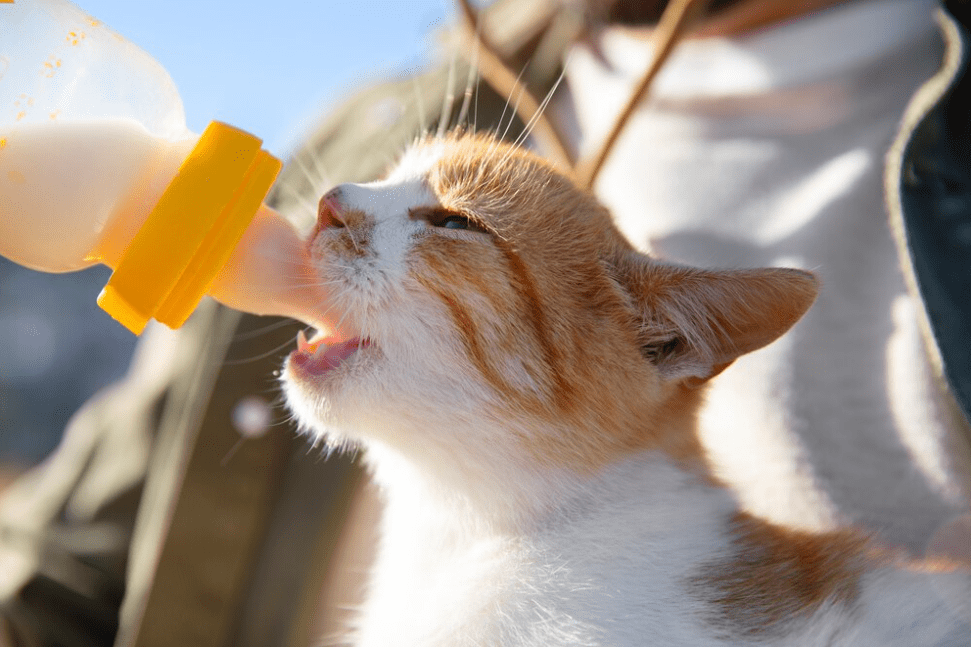
No, cats should not have almond milk as it can cause stomach upset and discomfort. Almond milk, along with other plant-based milk alternatives, should be avoided for cats due to their low lactase enzyme levels and potential digestive issues.
It is best to provide water as the primary choice of drink for cats.
Almond milk has gained popularity among health-conscious individuals as a dairy-free alternative. But can cats also enjoy a refreshing bowl of almond milk? Let’s find out.
While almond milk might seem like a safe option, it’s important to note that cats are lactose intolerant. They lack the necessary lactase enzyme to break down lactose, which can lead to stomach discomfort. As a result, it is not recommended to give almond milk to cats.
If your cat consumes almond milk, it could potentially upset its stomach, causing diarrhea, stomach pain, and vomiting. Cats have sensitive digestive systems, and introducing new food or drink could disrupt their gastrointestinal balance. Therefore, you should avoid giving almond milk to your feline friend.
When choosing milk for cats, you should select options specifically formulated for their needs. You can find special cat milk in pet stores, which is a safer choice since it contains low lactose levels. Additionally, you could consider goat milk as an option, but you should give it in small amounts. However, water is the best choice for proper hydration and maintaining overall feline health.
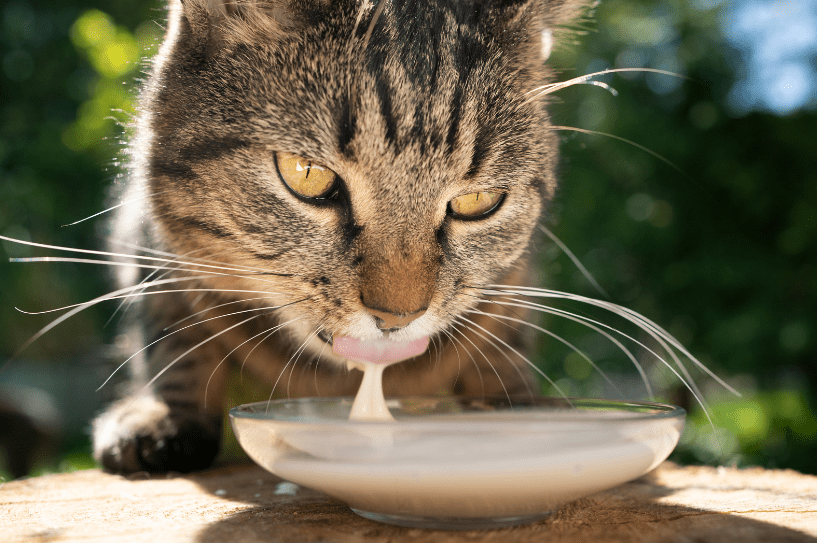
While almond milk is not toxic to cats, it may cause stomach upset due to their limited ability to digest lactose. Special cat milk or water is a safer and better option for your feline companion.
Almond milk is a plant-based alternative to cow’s milk that has gained popularity among humans, but can cats have almond milk? While almond milk may offer some benefits to cats, it is important to weigh the pros and cons before incorporating it into their diet.
While almond milk may have some benefits, it is crucial to consider the potential risks and side effects that could arise from feeding it to cats.
When it comes to feeding cats almond milk, it is crucial to exercise moderation and proper usage. We recommend giving cats almond milk only once or twice a week. While some cats may tolerate it well, others may suffer stomach issues. If you decide to introduce almond milk to your cat, closely monitor their reactions and consult with your veterinarian if any adverse symptoms occur. Remember, water is always the best choice for your feline companion’s hydration needs. If you want to offer your cat a special treat, consider options specifically formulated for feline consumption, such as cat milk or small amounts of goat milk. In conclusion, while almond milk may have some benefits, it is not a necessary part of a cat’s diet. It is important to prioritize their nutritional needs and consult with a veterinarian before introducing any new foods or beverages into their routine.
While almond milk is not toxic to cats, it is not recommended in large quantities due to the lack of lactase enzyme necessary for digestion. Special cat milk or goat milk may be safer options.
Special cat milk is specifically formulated for feline consumption and is often fortified with necessary nutrients. It is a safer option than regular cow’s milk as it has lower lactose levels, which can cause stomach upset in cats. However, it is important to note that even special cat milk should be given in moderation, as it still contains fats. Water is still the best choice of drink for your feline companion.
Goat milk is another alternative milk option for cats. Similar to special cat milk, goat milk has lower lactose levels and can be tolerated better by some cats compared to cow’s milk. Goat milk contains essential nutrients such as vitamins, minerals, and proteins that are beneficial for your cat’s overall health. However, it is important to consult with your veterinarian before introducing goat milk into your cat’s diet to ensure it is suitable for your specific cat’s needs.
In addition to special cat milk and goat milk, other plant-based milk alternatives can be considered for cats. However, it is crucial to note that cats are obligate carnivores and plant-based milk options should only be given in small amounts, if at all. Some plant-based milk options include almond milk, soy milk, and coconut milk. These alternatives have lower lactose levels compared to cow’s milk, but they still contain fats and may cause digestive issues if consumed in excess. Always consult your veterinarian before introducing any new food or drink into your cat’s diet.
Feeding almond milk to cats should be done in moderation as cats have a limited ability to digest lactose. While almond milk is a safer option due to its lower lactose levels, it can still cause stomach upset in some cats.
Water is always the best choice for their hydration.
Many cat owners wonder if it’s safe to feed almond milk to their feline companions. While cats can have almond milk in small amounts, it’s important to understand the proper quantity, frequency, and potential reactions to ensure your cat’s health and well-being.
When it comes to feeding almond milk to cats, moderation is key. It is advised to only give a cat almond milk once or twice a week. By limiting the amount of almond milk, you can reduce the risk of any potential digestive issues that may arise. Remember, almond milk should never replace water, which is the best choice of drink for your feline friend.
It’s essential to understand the frequency at which you can feed almond milk to your cat. While some cats may tolerate almond milk without any side effects, others may experience issues such as diarrhea, stomach pain, and vomiting. To ensure your cat’s comfort and well-being, it’s best to limit almond milk consumption to a moderate frequency of once or twice a week.
Although almond milk is generally safe for cats, it’s crucial to be aware of any potential reactions or symptoms. Some cats may experience stomach upset or allergic reactions when consuming almond milk. Common symptoms include diarrhea, vomiting, and stomach pain. If you notice any of these symptoms after feeding almond milk to your cat, it’s best to discontinue its consumption and consult with your veterinarian for further guidance.
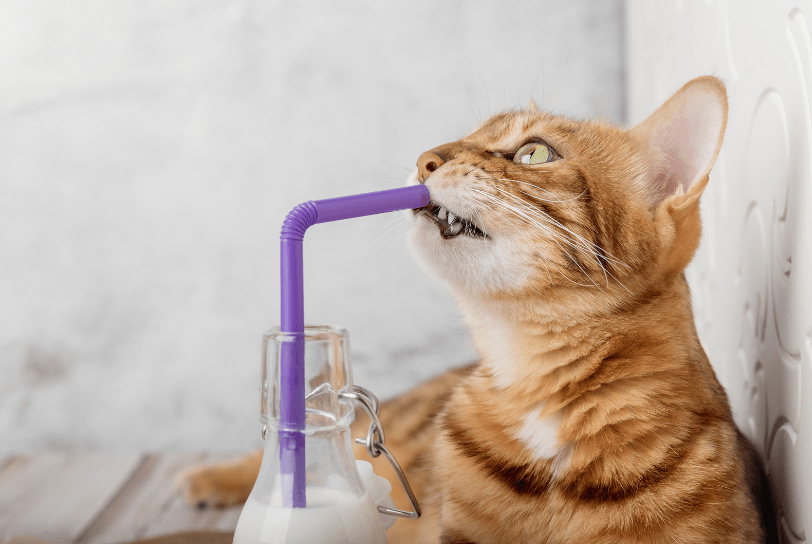
Almond milk has gained popularity as a dairy alternative for humans due to its various health benefits. However, when it comes to our feline friends, the question arises – can cats have almond milk? Let’s delve into the expert opinions on this matter to find out.
According to veterinary experts, although almond milk is not lethally toxic to cats like regular milk, it may cause some stomach upset. Cats lack the necessary lactase enzyme for the healthy digestion of milk, including almond milk. The high-fat content in almond milk can lead to digestive issues like diarrhea, stomach pain, and vomiting in some cats. Therefore, it is advised to offer almond milk to cats in moderation, only once or twice a week.
Veterinarians recommend special cat milk, goat milk, or water as the preferred choice of drink for cats. These options have lower lactose levels compared to regular milk and almond milk, reducing the risk of digestive problems. It is important to remember that cats primarily require water to stay hydrated and should avoid excessive consumption of any type of milk.
Many experts suggest that although almond milk can substitute cow’s milk for cats who are lactose intolerant, it doesn’t offer any additional health benefits compared to a balanced feline diet. Cats obtain their necessary nutrients from their regular cat food, and adding almond milk may not be necessary. However, if you still wish to give your cat almond milk occasionally, it is crucial to monitor their reaction and provide it in small amounts to avoid any digestive issues.
If you are a cat owner, you might be wondering if it is safe to give your baby cat almond milk. Kittens have different dietary needs compared to adult cats, and it is important to ensure that they are getting the right nutrients for their growth and development. In this article, we will explore the safety concerns of giving almond milk to baby cats and discuss alternative options that are more suitable for their delicate digestive systems.
While almond milk may be a popular plant-based alternative among humans, it is not recommended for baby cats. Cats, in general, have difficulty digesting lactose, which is found in milk. Although almond milk does not contain lactose, it can still cause stomach upset in most cats. Baby cats are particularly sensitive to dietary changes, and feeding them almond milk may lead to diarrhea, stomach pain, and vomiting.
If you are looking for a suitable milk substitute for your baby cat, it is best to opt for commercial kitten milk replacers. These milk replacers are specifically formulated to meet the nutritional needs of growing kittens. They provide the necessary nutrients, vitamins, and minerals that are essential for their development. It is important to note that cow’s milk should also be avoided as it can cause digestive issues in baby cats. Another alternative to almond milk is goat milk. Goat milk has lower lactose levels compared to cow’s milk, making it easier for cats to digest. However, it should still be given in small amounts and as an occasional treat since it contains fats that may lead to weight gain.
While it is common for kittens to be separated from their mothers at a young age, it is crucial to understand the importance of the mother’s milk in their early development. Mother’s milk provides essential nutrients, antibodies, and enzymes that boost the immune system and support healthy growth. If the mother is absent or unable to nurse, it is recommended to consult with a veterinarian who can provide a suitable milk replacer. In conclusion, almond milk is not suitable for baby cats due to their delicate digestive systems. It is important to prioritize their nutritional needs by providing them with commercial kitten milk replacers or consulting with a veterinarian for alternative options. Remember, nothing can replace the benefits of mother’s milk in the early stages of a kitten’s life.
When it comes to giving almond milk to cats, it’s essential to understand the importance of moderation. While almond milk may seem like a healthy alternative to cow’s milk, it should only be given to cats in small amounts. Considering a cat’s individual needs is crucial when introducing new foods or beverages into their diet. In this article, we will delve into the significance of moderation and explore the potential effects of almond milk on cats.
Cats are obligate carnivores, which means their bodies are designed to thrive on a meat-based diet. While almond milk may provide some nutritional benefits, it should never replace the necessary nutrients derived from a balanced feline diet. Moderation is key when offering almond milk to cats. Almond milk, like other plant-based milk, lacks essential nutrients that cats need for optimal health. It is important to remember that these milks are formulated for human consumption and might not provide the necessary vitamins and minerals for cats. While giving your cat almond milk in small quantities might not be harmful, it should never be the primary source of hydration or nutrition for your feline friend.
Before introducing almond milk or any new food or beverage to your cat, it’s crucial to consider their individual needs and any potential sensitivities. Even though almond milk is lactose-free, cats can still experience stomach upset when consuming it. Diarrhea, stomach pain, and vomiting are some common symptoms that cats may exhibit after consuming almond milk. If you are considering giving your cat almond milk, it is recommended to only offer it once or twice a week to minimize the risk of adverse reactions. Additionally, it’s always wise to consult with your veterinarian before introducing any new food or beverage into your cat’s diet. They will be able to provide guidance tailored to your cat’s specific needs and advise you on the best course of action.
While almond milk may be safe for cats in moderation, it’s important to remember that water is the best choice of drink for your feline companion. Cats are designed to obtain moisture primarily from their food, and water should always be readily available to them. If you are looking for alternative milk options for your cat, special cat milk or goat milk may be safer options due to their lower lactose levels. However, even these alternatives should only be given in small amounts as an occasional treat. Ultimately, the well-being of your cat should be your top priority. Providing a balanced and species-appropriate diet, regular veterinary check-ups, and plenty of love and affection are essential for your cat’s overall health and happiness.
Contrary to popular belief, cats can have almond milk, but only in moderation. While almond milk doesn’t contain lactose, it can still cause stomach upset in most cats. It’s best to stick to special cat milk or water as the main drink for your feline companion.
Many cat owners believe that since almond milk does not contain lactose like regular cow’s milk, it is completely safe for their feline companions. However, this is a common misconception. While almond milk does not contain lactose, it can still cause stomach upset in most cats. Cats lack the lactase enzyme necessary to break down milk, including almond milk, which can lead to discomfort such as diarrhea and stomach pain.
Another mistaken belief is that almond milk provides health benefits to cats. This is not true. Almond milk does not offer any nutritional advantages that cats cannot already obtain from a well-balanced diet. Cats require a specific balance of protein, fat, and other nutrients, which can be achieved through commercial cat food designed to meet their dietary needs. Therefore, almond milk is not essential and should not be considered a substitute for a nutritious diet.
Some people may also believe that almond milk can replace water in a cat’s diet. This is an erroneous assumption. While almond milk may contain some amount of water, it should not be treated as a substitute for plain water. Cats need to stay hydrated, and water is essential for maintaining their overall health. Almond milk should only be offered as an occasional treat in small amounts, and access to fresh water should always be available for cats. In conclusion, it is important to separate fact from fiction when it comes to giving almond milk to cats. Almond milk is not recommended as a regular part of a cat’s diet, and it should be given in moderation, free from any sweeteners, flavors, or additives. To ensure the well-being of your feline friend, it is always best to consult with a veterinarian regarding their dietary needs and any potential dietary changes.
While almond milk may be a popular dairy alternative for humans, it’s important to remember that cats have specific dietary needs. Although almond milk is not toxic to cats, it can cause stomach upset due to their limited ability to digest lactose.
In small amounts, almond milk may be given to cats occasionally, but it should not be a regular part of their diet. Ultimately, water is the best and safest choice of drink for your feline companion.

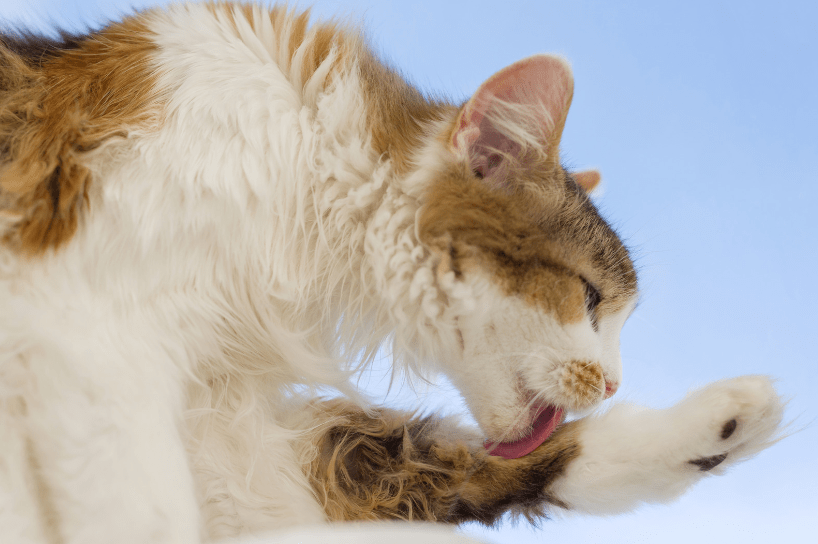
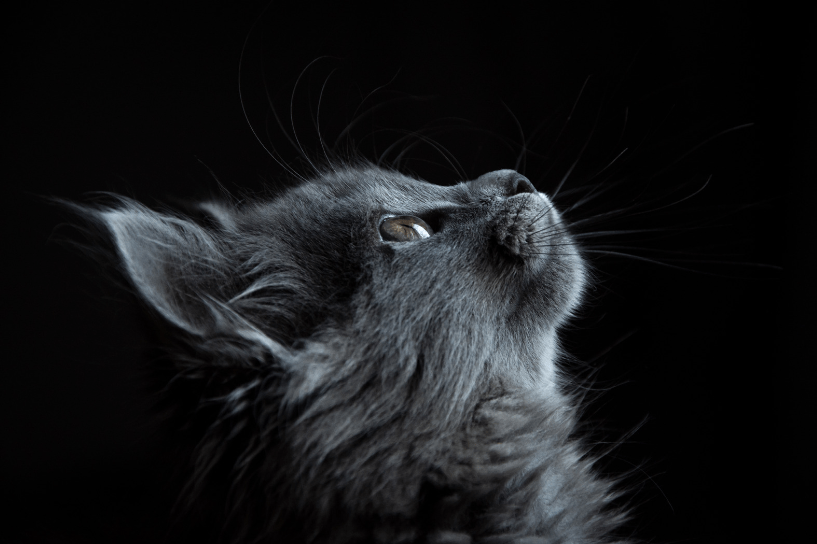
The Kitty Salon Groomer offers cats self grooming…
Why does my cat headbutt me? Headbutting is…
Cats contract the Feline Immunodeficiency Virus (FIV), also…
Cats lick themselves after you pet them to…
Cats groom themselves to maintain cleanliness and regulate…


